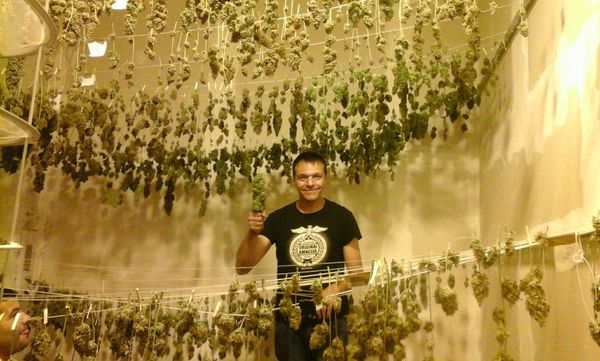- On 29 September a trial commenced at the Provincial Court of San Sebastian, in which the president and treasurer of the Urola Cannabis Association of Experimental Studies face a possible sentence of 3 ½ years of jail time, plus a hefty fine, unjustly accused of drug trafficking. Since its founding this Guipuzcoan club has acted in accordance with good practices, as this case demonstrates, once again, that the regulation of these types of groups is essential. At Dinafem we wish to support this association in these important judicial proceedings and to share the story behind them.

The Urola association was created in 2010 to provide its members with cannabis and to conduct informational, scientific and risk reduction activities. Organised as a club, the Asociación Cannábica de Estudios Experimentales de Urola (ACEE - AU) in Urretxu, Guipuzcoa, is comprised of 176 members, some with medical needs, and all of them previous consumers of cannabis, ages 21 and up.
This group provides its members with the necessary legal and therapeutic counselling, and strives to protect them from the black market, adulterations, compulsive consumption, and abuse. On 29 September, however, two members–their president, Gregorio Sancho Marchena and their treasurer, Ramon José Parra–will be tried by the Provincial Court of San Sebastian. They are accused of drug trafficking with "slight damage to health" after the Ertzaintza (regional police) seized their crops, removing 400 marijuana plants (about 12 kilos) in 2013.
The public prosecutor is asking for 3 ½ years of prison and a 350,000-euro fine, which Sancho considers "disproportionate," as he explained to Dinafem. For now, though two years have passed since the raid, the president has explained that the association remains active and will continue to engage in its activity as long as it is not declared illegal.

The group's story is one of coincidences. The members of this association decided to transfertheir crops from the centre of Urretxu to an industrial area in order to comply with the code of good practices applicable to these types of groups (to keep their activity from bothering residents).
Despite the precautionary measures the group had taken, it seems that the technology they used was insufficient to mask the scent emitted by so many cannabis plants, such that the smell ended up reaching the homes of their nearest neighbours.
The harvest was just two days away when the police decided to show up at the site, and without a court order. Sancho reports that they had always gotten along fine with those living nearby, and had never had a problem. In fact, many of them stood up for the association's members when the incident took place. It had all been a mistake. In the end, "when people smell marijuana, the public panics," he explained.
Gregorio Sancho explained that when this type of situation arises, they always cooperate with the police. "We are totally transparent. We have never hidden. That has always been our policy," he stated. In addition, the association had an authorised expert determine the amount of cannabis that it could cultivate, who indicated that they needed 42 kilos of grass to supply their members.

"We do not consider the amount of marijuana to be relevant," explained the president. He says that the important thing is that the product was not for his own consumption, nor was it going to be sold to third parties. Rather, it was for use by the members. Hence, they consider it unfair that they be tried for drug trafficking. "By no means are we pushers, and we're not dealing."
In this regard, Sancho states that they have all manner of documentation demonstrating that they observe the Basque Cannabis Federation's (EUSFAC) code of good practices, and that they have contracts, growing agreements, and documents containing cultivation and consumption forecasts. They hope that all this documentation, presented in court, will serve to demonstrate that they did not act in an illegal manner.
They find it hard to believe that they will be found guilty. "I imagine that we will be acquitted, without a doubt," says Sancho. However, if he were not, he would be willing to go to jail to defend his ideas.

The association's president reports that his activity is legal, in line with the law and the Supreme Court's doctrine on shared consumption. Although there is also the possibility that the public prosecutor will appeal an acquittal, he finds this unlikely, as the crime of which they are accused "is very minor."
In fact, this association's good practices precede it. Among other things, they do a radio show on risk reduction, as well as informative workshops on responsible consumption for members. They also hold annual symposiums on cannabis and its legal, social and therapeutic aspects. In addition, the A.C.E.E. (A.U) participates in the "Responsible Regulation" platform, and other activities designed to normalise and legalise cannabis use.
This is another example demonstrating how vital it is to regulate cannabis clubs, and that the time has come for Spanish activists to begin to demand their rights in a responsible way. Gregorio Sancho is hopeful and believes that, in light of the initiatives that are underway, in 2 or 3 years something similar to regulation will be in place, although there is still much to be discussed.
Of course, he believes that it would be unjust and cruel for them to be sentenced now, when they are just steps away from possible regulation in the Basque Country. "We would be like the last casualties in a war," he observed.



Comments from our readers
There are no comments yet. Would you like to be the first?
Leave a comment!Did you like this post?
Your opinion about our seeds is very important to us and can help other users a lot (your email address won't be made public).